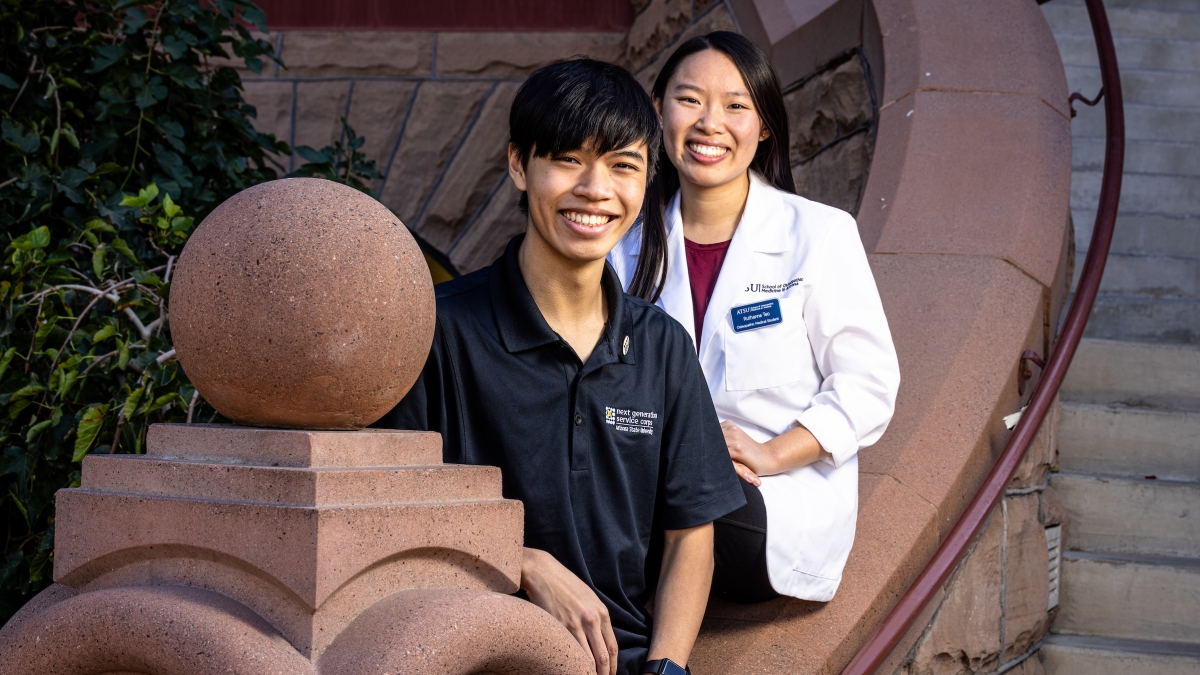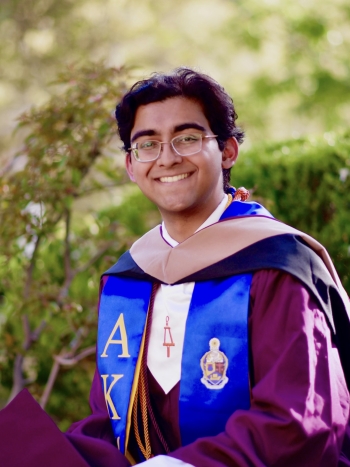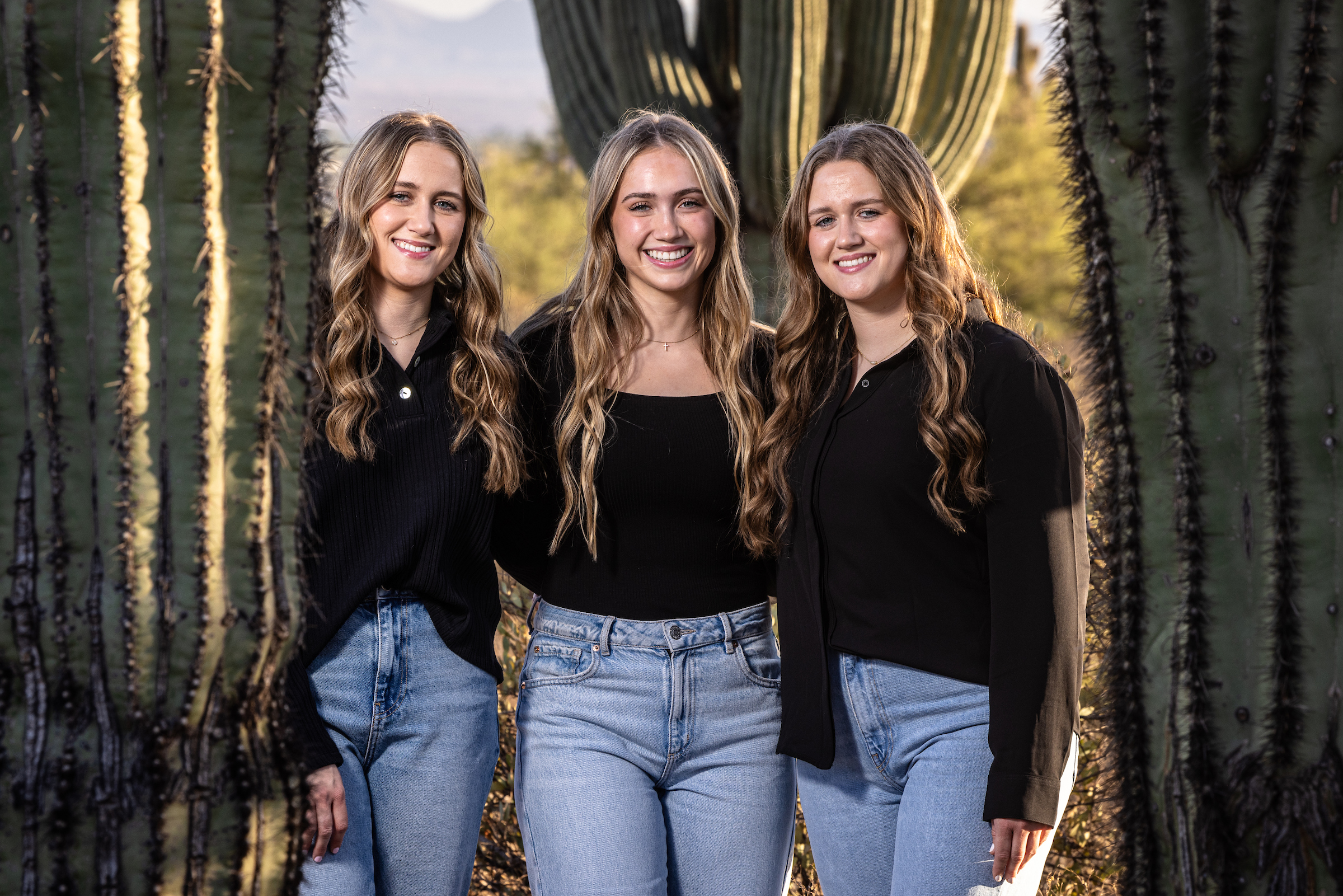Leadership runs in the family for these Public Service Academy siblings

Ruthanne Teo and her brother Nathaniel Teo pose for a portrait in front of Old Main on the Tempe campus on Oct. 31. Ruthanne was active in the Next Generation Service Corps in ASU's Public Service Academy until she graduated in 2022 with a biological sciences degree. Nathaniel is in his second year in computer systems engineering, and was recently appointed ASU ambassador to the Next Generation Service Corps, joining representatives from the other 16 universities. Their younger brother was recently accepted to ASU and intends to follow their tradition of joining the Public Service Academy. Photo by Charlie Leight/ASU News
In the last eight years, Arizona State University’s Public Service Academy has educated more than 900 undergraduates to positively impact society by working across sectors — military, government, private and nonprofit.
And the academy's Next Generation Service Corps, or NGSC, brings to life the vision for a national network of public service academies that provide student leaders with an opportunity to serve our country.
“The mission of the NGSC is to develop adaptive and collaborative leaders of character who cross sectors, connect networks and ignite action to solve local and global challenges,” said Cindy Parnell, chief of public service in the Watts College of Public Service and Community Solutions. "This includes a strong intent to build a pipeline of young leaders — studying diverse majors — to public service opportunities in the government, nonprofit, civic, social/human service, health and education sectors.”
Those values of public service and leadership also seem to run in the family, as demonstrated by three groups of siblings who have all participated in the Next Generation Service Corps.
We spoke to these separate families about why they got involved with the program, why they shared it with their siblings and how acquiring leadership skills has improved their lives.
The Pardhes
Joshua Pardhe was a 4.0 student in high school and 14 years old when he started dual enrollment at Maricopa Community Colleges. He said while he was comfortable with his personal academics, he realized that there were other areas where he wanted to improve on.
“Coming from a home-school background, I wasn’t around a lot of people my age,” said Pardhe, who is a financial consultant with Ernst & Young in New York City. “And I never really had an opportunity to develop my leadership skills before I joined ASU.”
Pardhe, who graduated in May 2022 with a bachelor’s degree in computer systems engineering and received his master’s degree in finance from the W. P. Carey School of Business the following year, said his first exposure to ASU entrepreneurship was in 2017 when he was 15. He had entered and won a $5,000 prize in the Cisco Innovation Challenge for developing an IoT framework of sensors monitoring residential/commercial water usage to search proactively for leaks to improve sustainability.
Veronica Gutierrez, senior manager of academic programming and student success in the Public Service Academy, extended an invitation for Pardhe to join the program.
“She said, ‘I see you’re interested in corporate social responsibility. Come to ASU and learn and advocate for sustainability while pursuing your degree,’” Pardhe said. “She also told me that I could pursue leadership development roles within the NGSC while at ASU. To me, that sounded like the perfect opportunity.”
Pardhe said he spent the first semester understanding the NGSC program and how it was structured. Since his sustainability mission team had more than 20 students, he worked to form different research “squads” to help his peers focus on multiple projects at the same time. Through leading that process, he became more involved and saw the leadership potential he could offer within the organization.
“Everyone has the capability to be a leader but it’s a matter of putting those skills to practice,” Pardhe said. “If you want the benefit, you must put in the effort. I simply applied it to where my passions lay.”
This approach worked out well for Pardhe, who went from mission team leader to section leader to deputy chief of staff leading approximately 80 people within the NGSC organization. Later, he served in an advisory role, assisting the next chief of staff before graduating from ASU.
“There was a shift in personality I had to overcome but I saw myself becoming more confident in being able to create a game plan, gathering people together, asking for their input, and then executing that vision,” Pardhe said. “When you pursue opportunities to practice leadership, learning how to effectively work with others to create and implement new ideas, it lays a strong foundation for long-term personal and professional success.”
Parde wanted to pass along his wisdom to his 17-year-old sister Elizabeth, who is a first-year student at ASU and a Public Service Academy member.
“Joshua commuted to ASU his entire college experience, and he would go back and forth to his NGSC events and I would come along to his award ceremonies,” said Elizabeth, a Barrett, The Honors College student majoring in data science in The College of Liberal Arts and Sciences. “I was able to meet some of his friends and mission team members, and it was helpful in terms of giving me a feel for the program. It also felt like a really large family in some ways, and I was able to meet people who were passionate about the same topics I was passionate about.”
Elizabeth hit the ground running in her first semester and is part of the NGSC innovation committee. She has already planned an event for the committee for a think tank group and will be taking on more leadership roles in the future.
“I would like to become chief of staff one day, like my brother,” Elizabeth said. “For now, I’d like to be the best team member I can be and help wherever I can.”
The Becks
Hanley and Halle Beck hail from Burley, Idaho, a small city of about 12,000 people in the southern part of the state. While researching colleges, they learned about ASU’s Public Service Academy and were immediately drawn in.
“I really wanted to be involved in something that was bigger than myself,” said Hanley, a graduate student in materials science and engineering in the Ira A. Fulton Schools of Engineering. “When reading and learning about the Public Service Academy, I saw the potential for leadership growth and the opportunity to make a big impact … so I was just really hooked.”
And so was her twin sister, Halle.
"We were both looking at different programs and we had the NGSC at the top of our list, but we discovered it separately,” said Halle, who, like her twin, is a graduate student in materials science and engineering. “The program did not disappoint, and it lived up to all of our expectations.”
Though the two look alike, have the same majors and are both keenly focused on issues surrounding sustainability, they’ve also discovered through their work at the Public Service Academy that their leadership styles are also the same.
“I’m reserved and like to take a step back and kind of watch,” Halle said. “I like to see what roles need to be filled and how everyone falls together in the group.”
Hearing Hanley describe her leadership style almost sounds like an echo of Halle.
“I initially take a step back, observe and watch, see how I can help and then take action accordingly,” Hanley said. “I will step up and help, but I mostly help facilitate and make sure the leader’s getting what they need.”
They are also focused on the needs of their younger sister, Karlei, who they felt was a natural for the Public Service Academy.
“Karlei’s always been the type of person who, if she sees something, will do something about it,” Hanley said. “If she saw someone who was mean to a kid, she’d step up or talk to the teacher who made sure that student was getting the support they needed. We thought she’d be good for the program.”
Karlei said she heard about the Public Service Academy from her older sisters ever since her sophomore year in high school.
“I heard them talking about the program and all of the opportunities they were participating in and how they gained from it,” said Karlei, a first-year forensic psychology major with a minor in Spanish. “I also saw how their core values were respect, responsibility, integrity and selflessness. Those things aligned with my personal values.”
Karlei said she is more outspoken and verbose than her sisters and has taken on leadership roles in high school.
“I’ve always been the leader on the school volleyball team or clubs in school but I wanna be able to say and do things that will impact more people,” Karlei said, who joined the Domestic Violence Mission Team this year.
She said because she’s a first-year student, she’s hasn’t taken on a leadership role in the Public Service Academy … yet.
“I’ve watched my sisters become leaders very quickly and I’m sure they were uncomfortable at first,” Karlei said. “I’m OK with being uncomfortable because I believe that growth comes from when you aren’t comfortable.”
Karlei Beck (center) and her big sisters, twins Hanley (left) and Halle, pose near their home in Rio Verde, Arizona, on Nov. 3. The twins are graduate students in materials science and engineering and are in their fourth year participating in the Public Service Academy. Their volunteering inspired Karlei, a first-year forensic psychology major, to follow in their footsteps at the Public Service Academy. Photo by Charlie Leight/ASU News
The Teos
Ruthanne Teo is a second-year student in medical school who graduated from ASU in 2022 with a degree in biological sciences. But the leadership skills she learned while in the Public Service Academy still resonate in her life.
“I absolutely loved it! I really grew as a leader,” said Teo, who attends the A.T. Still University School of Osteopathic Medicine in Mesa, Arizona. “I entered the program kind of shy and not really confident in who I was as a leader, but I knew I wanted to make a tangible change in the community.”
She said the Public Service Academy gave her the space and opportunity to grow in her confidence as a leader.
“I was interested in making a change in public health, and being in the NGSC gave me all of the opportunities not only to help but become a leader,” Teo said, who hopes to practice family medicine. “I started out as a public health mission team member my first year, became the team leader my second year, then was made a section lead the next year, where I was in charge of three mission team leaders.”
Her big projects were organizing two health panels for Public Service Academy members, one of which included the former CEO of Mayo Clinic, to offer advice on how best to address mental and health care issues, networking with other organizations, and advocating for and serving the people in the community.
“I feel like the program forced me to be independent and find my own opportunities,” Teo said. “There were times when I was still nervous and shy at times as I was being pushed out of my comfort zone, but I had grown a lot in my confidence and leadership skills, and I wouldn’t change my experience for the world.”
Teo said she also learned through the Public Service Academy that there were different ways to lead. Hers was to help others grow in their leadership potential, like her younger brother, Nathaniel.
“He was already a leader — not just wanting to become one — and making a change by serving in his community and coming up with ideas to do more,” she said. “I knew he would be a great fit for the program.”
Nathaniel said when his sister talked about the Public Service Academy, he was inspired.
“I’ve always had a heart for community service, but it wasn’t until I got closer to high school graduation that I seriously considered joining NGSC,” said Nathaniel, a second-year computer systems engineering major in the Ira A. Fulton Schools of Engineering. “Ruthanne’s work with the public health mission team showed me how much impact the program could make if you are surrounded by like-minded people willing to make it happen.”
Nathaniel’s particular passion was improving the quality of public education, particularly in STEM.
“School had become a check mark for a lot of people my age, and I want to help change that perspective,” said Nathaniel, who serves on the education mission team. “I think that can be accomplished by changing the perspective on school by providing different ways to cultivate creativity and innovation.”
Nathaniel is now leading the education mission team this semester and is learning how to manage a team. In addition, he serves as NGSC’s program ambassador, acting as a liaison between ASU and other NGSC programs in universities across the nation. He’s leaning on his older sister once again to show him the way.
“She has been providing amazing support, showing me how to organize and run a team, providing resources, and helping me to be diplomatic with others and understanding different perspectives,” Nathaniel said. “I have always seen her as a leader — in the past, right now and in the future.”
Scholarship applications for the Next Generation Service Corps are being accepted now with the priority deadline of January 2024.
More Science and technology

ASU-led space telescope is ready to fly
The Star Planet Activity Research CubeSat, or SPARCS, a small space telescope that will monitor the flares and sunspot activity of low-mass stars, has now passed its pre-shipment review by NASA.…

ASU at the heart of the state's revitalized microelectronics industry
A stronger local economy, more reliable technology, and a future where our computers and devices do the impossible: that’s the transformation ASU is driving through its microelectronics research…

Breakthrough copper alloy achieves unprecedented high-temperature performance
A team of researchers from Arizona State University, the U.S. Army Research Laboratory, Lehigh University and Louisiana State University has developed a groundbreaking high-temperature copper alloy…




